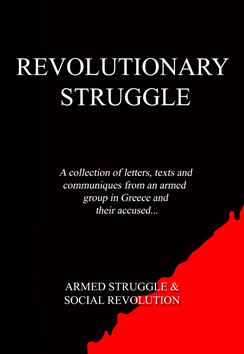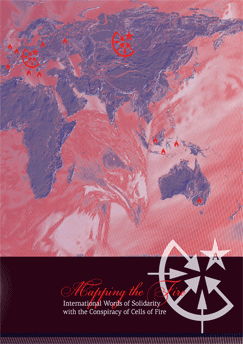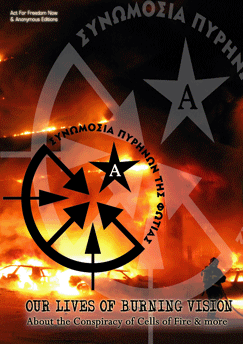Issue #4 of the radical ecology paper ‘L’Urlo della Terra’ is out (Italy)

In this issue: in Italian language:
– Starting again from Nature
– The struggle against technology: a few thoughts
– Transplants: tears of those who receive and those who give or sell
– Post-human anti-specist crossing
– Fastidious Xylella, unbearable State – Chronology of a false emergency and considerations on the subject
– Leaps in the night…
– A letter to the Expo 2015 catering – Analysis of a counterproductive action
– Solidarity and complicity, on nocivities and the need to oppose them – Notes on the attempted attack on IBM in Switzerland by Silvia Billy Costa and their trial in Italy
EDITORIAL:
What does starting again from Nature mean? Has it been abandoned?
We’re certainly losing interest in it precisely when it deserves all our attention, commitment and energy.
Hearing the urgency for green spaces, environmental dangers, more ecological catastrophes to come, yet another rare and ‘photogenic’ species at risk of extinction… being shouted out by the media every day, our capacity for empathy towards what is less and less around us or under our feet, the Earth, has become saturated.
The daily description of the ongoing ecocide is lost among many other likewise serious events such as war; in this inextricable tangle of cause and effect, one puts up with the impotence in thinking about the future and understanding the present, so much so that certain milieus now incapable of looking beyond have come to the point of even supporting misanthropic theories about human extinction.
When one talks about ecology and the environment the discourse is always addressed to the benefits for human beings and their domesticated species. The divide is deepening radically, one believes that the wild side is now something distant from oneself, simply because one no longer sees or feels it. Industrial vegan food is closer to agri-business than nature.
In a context where nature is degraded, the dramatic consequences of this degradation are being inflicted on the whole of society, which can’t do without nature. These always present themselves with many names and different causes, but the actual source of the problem is never tackled.
The ecological crisis suggests the indispensability of nature and the impossibility to find a substitute for the processes that sustain life. The limited response to the ‘eco crisis’ strengthens the logic of doing without it: it implies that the process that sustains life can be fabricated in laboratories and factories. In fact, this kind of response to the eco crisis blurs the boundary between laboratory and factory, science and profit.
It is therefore easy to understand why artificiality has become the ideology of power that is most in fashion, which denies the necessity of nature and even its very existence; and it does so because it wants to become what it has always wanted to be: totality men can’t even hope to get out of, a world without outside.
By destroying nature inside and outside us, power intends to place itself as the one and only reality: it refers to the natural world with every possible image and word, but it is already quite something else.
Power has always been terrorized by the existence of something different from itself, something which could criticize it or even deny it. This impatience in announcing the abolition of nature in order to make space for something completely different, something that goes through gene and atom modification, is therefore clear. By deciding the suppression of the world that is outside it, i.e. the world of nature, dominion frees itself from the necessity to tackle its own contradictions: the world is only a pretext to refine its omnipotence.
Power has eliminated the contradictions that could induce it to reflect on itself, so that soil erosion, the loss of biodiversity, climate change, a dramatic increase in tumour spreading appear as signals of some obvious error of method; instead of pondering on these occurrences and changing its trajectory, power tries with all means to destroy or recuperate the warning that challenges it: it invents yet more deadly pesticides, restricts the field of wilderness, presents one-crop cultivation as a model, creates plants resistant to ‘out-of-soil’ drought and miraculous therapies to reduce metastasis formation. It’s been a long time since nuclear catastrophe was strongly present in people’s feelings and the system itself didn’t have many reassuring arguments on the matter, given that Hiroshima and Nagasaki were far too recent memories.
On the contrary, today’s ecological crisis, far from being a signal for alarm, is an excellent opportunity for the realization of power’s project of substituting the old world of nature with an entirely artificial universe, amidst the pressure of events; the opportunity to definitely sweep away all reticence, doubts and objections put forward by the old world made of unintelligible nature. The utopia of a ‘second nature’ more efficient than the first, of a techno sphere perfectly safe and immune to dangers, uncertainties and the coincidences and risks of natural life, certainly won’t keep any of its promises.
The surrogate of a life under technical perfusion, constantly evoked as ideal, realizes itself in reality as constant instability. This is no problem for those who run and govern the power of this techno world; never mind if the legacy and negative consequences of their optimism are repeated failures, sudden collapses, disasters, degradation and devastation as big as the world. The more nature is crushed and destroyed, the more it bounces back with yet more force and unpredictability, reminding us that the world wasn’t born under genetic bombardments or graphene coating.
But what is this nature?
It is what was not created by man, that wonderful and at the same time fearsome world, which will never be controllable: it is outside and inside us at the same time. The destruction of nature is also our own destruction, just like an onco-mouse only has family inside a research laboratory.
For contacts and orders:
urlodellaterra@inventati.org
3 euros per copy plus 1.30 euro postal charges
For 5 copies and over: 2 euros per copy plus 1.30 euro postal charges
For orders abroad: 5.50 euros
Bank account
IBAN: IT11A0760111100001022596116
BIC BPPIITRRXXX
Account name: Marta Cattaneo; specify L’urlo della Terra
Translated by Act for freedom now!, via informa-azione
Tags: Biotechnology, Costantino Ragusa, Ecological Destruction, Italy, Luca Bernasconi, L’Urlo della Terra, Silvia Guerini, Zine
This entry was posted on Monday, March 21st, 2016 at 1:26 pm and is filed under Eco Struggle.









